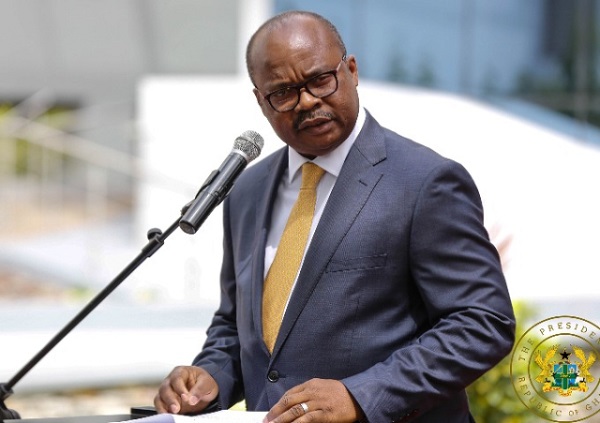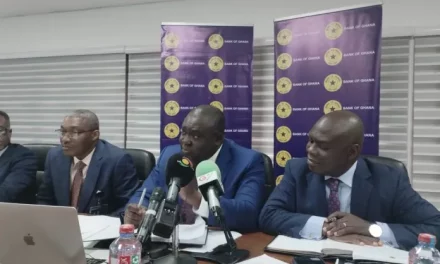
BoG’s New Framework To Strengthen Banking Sector3 min read

The Bank of Ghana has commenced a Business Model and Viability Analysis (BMVA) framework to enhance assessment of banks’ business model sustainability.
The initiative was announced by Dr. Ernest Addison, Governor-Bank of Ghana, at the Ghana Association of Banks (GAB) 40th Annual General Meeting and launch of the GH Bankers’ Voice Magazine’s 3rd edition.
The BMVA Framework, as explained by Dr. Addison, will enhance supervisory practices for assessing the sustainability of banks’ business models.
“BMA allows supervisors to identify banks’ vulnerabilities at an early stage and ensure safety and soundness. Following the DDEP’s adverse impact, the Bank of Ghana is focused on assessing the implications of banks’ strategic decisions and its alignment with their risk appetites,” he said.
The Bank of Ghana has also included a limited Asset Quality Review (AQR) in its supervisory programme for 2023. This exercise aims to evaluate the health of banks’ loan and investment portfolios, ensuring their asset classification aligns with the Bank of Ghana’s norms and International Financial Reporting Standards.
Furthermore, the Bank of Ghana is set to intensify its regulatory reform agenda by engaging with the GAB to roll out Pillar 2 of the Basel II/III capital framework. This framework will mandate banks to maintain adequate capital to mitigate material risks in their operations. Dr. Addison explained: “Regulatory guidance will encompass various aspects of Pillar 2, including Liquidity Risk Management, Internal Capital Adequacy Assessment Process (ICAAP), Guide to Supervisory Intervention, Concentration Risk, and Interest Rate Risk in the Banking Book.”
To facilitate smooth implementation of Pillar 2, the Bank of Ghana issued its Risk Management Directive in November 2021 – requiring banks to establish comprehensive risk management systems.
Dr. Addison emphasised the Bank of Ghana’s unwavering commitment to fostering a strong, stable and viable banking industry to support Ghana’s growth agenda. He said: “While several policy measures have been implemented over the recent past, a lot remains to be done in promoting a more resilient banking industry”.
Addressing specific risks such as high Non-Performing Loans (NPLs), poor corporate governance and inadequate risk management systems, the Bank of Ghana aims to promote robust risk management practices, including cyber and information security. The continued roll-out of Basel II/III capital standards will further enhance the banking sector’s resilience; and improved collaboration with other regulatory bodies will strengthen the regulatory framework for banking groups.
The banking sector’s performance in the first eight months of 2023 displayed noteworthy growth in profits compared to the losses experienced in 2022 due to the DDEP. Dr. Addison expressed optimism about this trend, stating: “If this trend persists, we expect banks to rebuild capital buffers quickly – especially with equity capital injections by shareholders – to build resilience and contribute to the economy’s growth”.
Banks in Ghana have reported robust profitability, attributed to portfolio shifts and exchange rate revaluation effects. In August 2023, the industry witnessed a remarkable 41.4 percent increase in profit-before-tax compared to the previous year, along with a 37.9 percent growth in profit-after-tax to GH¢13.5billion. Return-on-assets improved to 5.4 percent from 4.7 percent, and return-on-equity surged to 36.9 percent from 23 percent.
Despite the positive outlook, 2022 audited financial statements revealed impairments in capital levels for some banks – albeit with most maintaining Capital Adequacy Ratios (CAR) above the 10 percent regulatory minimum by the end of 2022. These CARs were attributed to regulatory relief measures implemented to cushion banks against effects of the DDEP. Consequently, the Bank of Ghana directed banks to submit capital restoration plans – aiming to recapitalise progressively over a three-year period ending in 2025.
To bolster recapitalisation efforts, early operationalisation of the Ghana Financial Stability Fund is expected to provide additional support for eligible banks in line with criteria agreed upon with the IMF and World Bank.
Dr. Addison reassured the public of BoG commitment to closely monitoring developments in the banking sector.



















